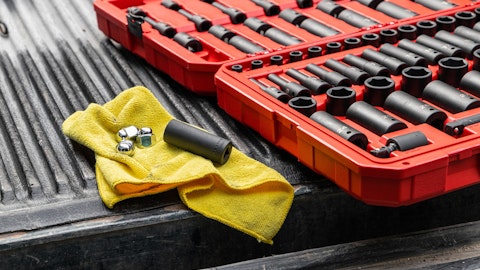Ryan Merkel : Perfect. Got it. Okay. And then just a question on RDS. That was where you missed our model in 1Q and one of the comments was it’s impacted more than the other businesses. I’d just like to dig into that a little bit because that’s how like a business where you were taking share putting a lot of keys out there, why isn’t RDS doing better? And why is it — why is it more impacted than the other businesses?
Doug Cahill: Ryan, it’s a great question and we’re disappointed with RDS. I would say, the first answer to your question is, if you look at for example engraving patent, 70% of households — 70% owned a patent in 2020 and now it’s 63% and dog ownership down 6%. I mean if you look at PetSmart Petco anybody in the pet side they’re selling food. They’re not selling the shrinkage in trash and all the other things that go with that because it’s discretionary. So, footsteps do also drives of that and footsteps do drive people going into cutting the key. And we know footsteps have been down 11 eight and eight year to date that has an impact. So that’s what we mean when we say has impact. I think the other thing is used car sales. I mean we really like our business on smart Bob, but when used car sales are where they are, people just aren’t going out to get the filed.
And so not an excuse our biggest issue is the same one. As I said last time, you basically got a situation where the folks in Bentonville have relocated from the front of the store in the front vestibule or the front wall by the register. They’ve taken machines and kiosks and they’ve moved them to the Auto Center, the sporting goods and the paint department. And quite honestly, you could be a consumer there in the future, you could make four or five visits to that store and may not know they cut keys versus you’d run into it either on your way out or your way in. And I don’t disagree with Macmillan strategy there. I think it’s probably a good one for them, but it doesn’t help the kiosk business. And so, we should pick up those keys at our other retailers, but that’s our biggest problem.
And it has been our biggest problem and we’ve got to let that thing sort out as they move those machines and we see what the new normal is there. So, it’s a little worse than we thought, but as we said for — and that’s why we’re really pushing the 3.5. So the capabilities are different for the consumer on that many key machines, but that’s what’s going on there.
Rocky Kraft: Let me add just quick there. When you think about our DSO which our entire business is impacted either by discretionary, we believe for buy existing homes. When you think about our other businesses, repair, maintenance, remodel, so repair and maintenance is done pretty much regardless of what is happening with existing home sales where discretionary spending is the remodel that’s going to have the bigger impact. So again to your question about, why a bigger impact in RDS because the entire business is impacted by these macro factors whereas our hardware protective Canadian businesses are parts are but not all.
Ryan Merkel: Very helpful. Thank you. I’ll pass it on.
Rocky Kraft: Thanks, Ryan.
Operator: One moment for our next question which will come from Quinn Fredrickson of Baird. Quinn, your line is open.
Quinn Fredrickson: Hi, good morning guys.
Rocky Kraft: Hey Quinn.
Quinn Fredrickson: First, just wanted to ask on SG&A. Rocky, I think you said around 30% of sales the rest of the year if I got that right, is that where you were in 1Q maybe some of the onetimers that you called out, just any color there?
Rocky Kraft: Yes, we were a little bit over that in the first quarter, but that’s where we expect the remainder of the year to be.
Quinn Fredrickson: Okay. Thank you, very helpful. And then secondly, on the Canada margin strength in the quarter, can you maybe unpack just what drove that and kind of sustainability from here you have for them.
Doug Cahill: Yes, for them, they picked up some new business and the margin profiles better than their fleet. They’ve also started and that’s one of the bright spot for our key business. They’ve started to install many key machines which will help their mix. And then Quinn, I’d love to say they smoked it, but their core their first quarter in ’23 was underwhelming. So it was a, easier comp.
Quinn Fredrickson: Okay. All right. Thank you, guys.
Doug Cahill: Thanks, Quinn.
Operator: [Operator Instructions] And I’m showing no further questions. I would now like to turn the call back to Mr. Cahill for closing comments.
Doug Cahill: Thanks again everyone for joining us this morning. We look forward to updating you on our progress this summer. And congrats to Jamie on getting to his first earnings call, good job. Thank you everyone.
Operator: You may now disconnect.
Follow Hillman Solutions Corp. (NASDAQ:HLMN)
Follow Hillman Solutions Corp. (NASDAQ:HLMN)
Receive real-time insider trading and news alerts

